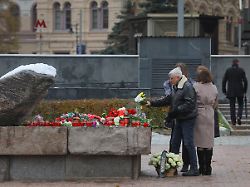Dangerous remembrance
War opponents remember Stalin’s victims in Moscow
October 29, 2023, 5:46 p.m
Listen to article
This audio version was artificially generated. More info | Send feedback
Since the war against Ukraine, the Kremlin has become increasingly repressive towards critics. Nevertheless, human rights activists in Moscow venture to Lubyanka Square to commemorate Stalin’s victims at the former KGB headquarters. War opponent Orlov also now sees “a totalitarian regime” in Russia.
Despite enormous restrictions by the authorities, people in several Russian cities commemorated the victims of political repression during Soviet times. With a view to the official day of remembrance on October 30th, several ambassadors from Western countries, among others, laid flowers on Lubyanka Square in the center of Moscow this Sunday. Prominent Russian human rights activists were also present, including the co-founder and chairman of the Memorial organization, which has now been banned by the Russian judiciary, Svetlana Gannushkina and Oleg Orlov. However, the police only let a few people through to the so-called Solovetsky Stone, which was cordoned off with bars.
The stone serves as a memorial in Moscow to the millions of people who died, particularly under Soviet dictator Josef Stalin from 1924 to 1953. Until a few years ago, human rights activists always called for major actions at the site on October 29th and traditionally read out the names of the victims, many of whom were shot in the 1930s, under the motto “Return the Names”.
Such actions are currently banned – the Russian authorities officially justify this with alleged anti-Covid measures. Since there have been almost no corona restrictions in Russia for a long time, Kremlin critics see this as pure harassment in times of Russia’s war of aggression against Ukraine.
“Idiot absurdity”
“This is an idiotic absurdity,” said human rights activist and war opponent Orlov on site at Lubyanka, where the feared secret service KGB was based in Soviet times and where its successor, the FSB, is now located. “It shows that the regime that has now developed again in Russia is a totalitarian regime that does not tolerate any dissent,” added the 70-year-old, who was recently fined for his criticism of the war.
Especially since the start of the war against Ukraine, Russia has massively increased pressure against critics and dissidents in its own country. Those who “discredit” one’s own army now face many years in prison.
